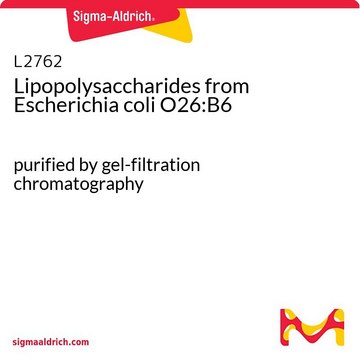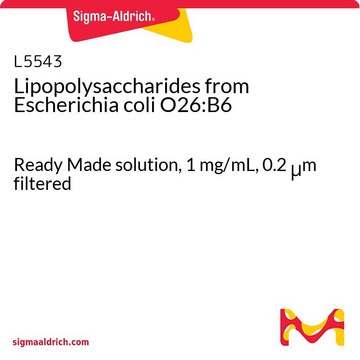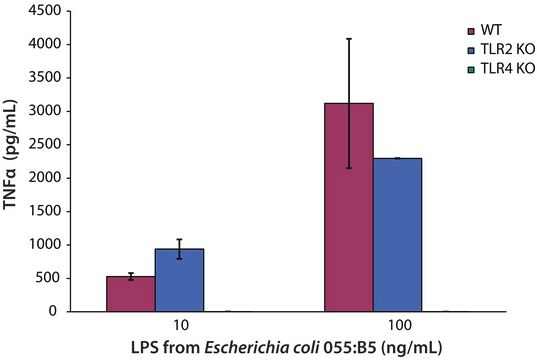L3755
Lipopolysaccharides from Escherichia coli O26:B6
purified by trichloroacetic acid extraction
Synonym(s):
LPS
Sign Into View Organizational & Contract Pricing
All Photos(2)
About This Item
Recommended Products
biological source
Escherichia coli (O26:B6)
Quality Level
form
lyophilized powder
purified by
trichloroacetic acid extraction
impurities
1-10% Protein (Lowry)
color
white to yellow
solubility
water: soluble
shipped in
ambient
storage temp.
2-8°C
Looking for similar products? Visit Product Comparison Guide
General description
This product is TCA extracted from E. coli serotype O26:B6. The source strain is ATCC 12795. LPS from serotype 026:B6 is the only LPS from E. coli which exhibits short chain-length behavior on SDS-PAGE. The short chain-length of this LPS is closer to that of the mutant rough strain LPS.
Application
Lipopolysaccharides (LPSs) are characteristic components of the cell wall of Gram-negative bacteria. LPS and its lipid A moiety stimulate cells of the innate immune system by the Toll-like receptor 4 (TLR4), a member of the Toll-like receptor protein family, which recognizes common pathogen-associated molecular-patterns (PAMPs).
Biochem/physiol Actions
Lipopolysaccharides (LPS) are localized in the outer layer of the membrane and are, in noncapsulated strains, exposed on the cell surface. They contribute to the integrity of the outer membrane, and protect the cell against the action of bile salts and lipophilic antibiotics.
Preparation Note
The product is soluble in water (5 mg/ml) or cell culture medium (1 mg/ml) yielding a hazy, faint yellow solution. A more concentrated, though still hazy, solution (20 mg/ml) has been achieved in aqueous saline after vortexing and warming to 70-80 oC. Lipopolysaccharides are molecules that form micelles in every solvent. Hazy solutions are observed in water and phosphate buffered saline. Organic solvents do not give clearer solutions. Methanol yields a turbid suspension with floaters, while water yields a homogeneously hazy solution.
Other Notes
To gain a comprehensive understanding of our extensive range of Lipopolysaccharides for your research, we encourage you to visit our Carbohydrates Category page.
related product
Product No.
Description
Pricing
Signal Word
Danger
Hazard Statements
Precautionary Statements
Hazard Classifications
Acute Tox. 2 Oral
Storage Class Code
6.1A - Combustible acute toxic Cat. 1 and 2 / very toxic hazardous materials
WGK
WGK 3
Flash Point(F)
Not applicable
Flash Point(C)
Not applicable
Personal Protective Equipment
dust mask type N95 (US), Eyeshields, Gloves
Choose from one of the most recent versions:
Already Own This Product?
Find documentation for the products that you have recently purchased in the Document Library.
Customers Also Viewed
Guohui Cai et al.
Scientific reports, 6, 21097-21097 (2016-02-13)
Early life diet can critically program hypothalamic-pituitary-adrenal (HPA) axis function. We have previously shown rats that are overfed as neonates have exacerbated pro-inflammatory responses to immune challenge with lipopolysaccharide (LPS), in part by altering HPA axis responses, but how this
Rupali Sharma et al.
International journal of developmental neuroscience : the official journal of the International Society for Developmental Neuroscience, 71, 94-104 (2018-08-31)
Puberty is a critical developmental period that is characterized by significant brain development. Exposure to stress during this time can alter brain functioning setting the stage for long-lasting behavioural outcomes. The objective of this study was to investigate age and
Rupali Sharma et al.
Journal of immunology (Baltimore, Md. : 1950), 202(7), 2131-2140 (2019-02-10)
Puberty is a critical period of development marked by sexual, immune, and neural maturation. Exposure to stress during this period can lead to enduring changes in brain functioning and in behavior; however, the underlying mechanisms and the programming effects of
Rose B Joachim et al.
Molecular systems biology, 14(5), e7998-e7998 (2018-05-19)
Attempts to develop drugs that address sepsis based on leads developed in animal models have failed. We sought to identify leads based on human data by exploiting a natural experiment: the relative resistance of children to mortality from severe infections
Rose Joachim et al.
Scientific reports, 7(1), 16541-16541 (2017-12-01)
Sepsis is a common and deadly syndrome in which a dysregulated host response to infection causes organ failure and death. The current lack of treatment options suggests that a new approach to studying sepsis is needed. Pre-pubertal children show a
Our team of scientists has experience in all areas of research including Life Science, Material Science, Chemical Synthesis, Chromatography, Analytical and many others.
Contact Technical Service



